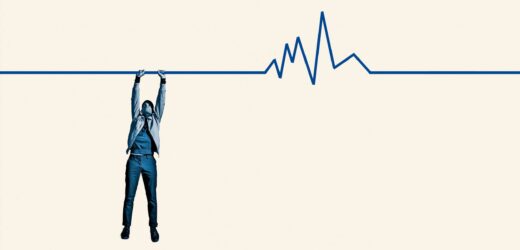WHAT is it about men and their unwillingness to see a doctor? Studies have shown that men often ignore health concerns, and nine out of 10 won’t even speak to their doctor or pharmacist unless the condition is super-serious.*
“From not wanting to appear vulnerable to believing that they need to ‘toughen it out’, men tend to downplay symptoms or just put it down to getting older,” explains Dr Deborah Lee from online pharmacy Dr Fox.
Well, we think it’s time to change this habit of a lifetime! Read on for our Father’s Day health check and advice to make sure the men in your lives are taking the best care of themselves.
He needs to work out
We’re not talking about sending him off to get ripped, but daily exercise is essential. Not only is it good for his overall mental health, giving a rush of feel-good endorphins, but it’s also a great way to stave off heart disease – the leading overall cause of male death in the UK.
If ignored, coronary heart disease (CHD) could lead to a heart attack – each year, 119,000 men suffer one of these, compared to 69,000 women. Also, as men age and their testosterone decreases, so does muscle mass, meaning it’s easier to pile on the pounds – another risk factor in developing CHD.
Train him up
So how do you get that ticker healthy? “Cardio, such as running, cycling or swimming,” says Alex Crockford, PT and creator of the #CrockFit app.
“Make sure resistance training is a part of his routine, too. Body-weight training – such as squats, lunges, push-ups and pull-ups – is just as effective as deadlifting weights.”
He’s depressed
Suicide is the biggest killer of men under 45 in the UK. It causes 18 deaths a day, and they are three times more likely to take their own lives than women.**
“Men may feel the stigma of mental illness more than women, and so tend to internalise their fears and emotions,” explains Dr Lee. “They are also more likely to turn to alcohol and/or drugs.”
Show he’s not alone
“While depression is serious, it is treatable,” says Dr Lee. “Not everyone with depression appears obviously depressed. Difficulty concentrating, being very irritable, loss of interest in things they used to enjoy, eating less well, drinking too much, being tired all the time, having no energy and a low libido are all signs, too,” she says.
“Start by asking: ‘Why don’t you tell me how you’re feeling?’ Avoid joking or suggesting they need to ‘man up’, as that could shut down the conversation.”
Also try active listening. “Repeat what they have said back to them, as it shows you have understood,” Dr Lee adds. “With depression, people often feel worthless, so emphasise how important they are and that they’re not alone.”Remember that Samaritans (free helpline 116 123) are always there, too.
He has trouble sleeping
So much of our health is tied up with how well we sleep. “Typically, men have higher alcohol consumption rates, and this can affect their sleep in a negative way, as alcohol inherently changes the structure and quality of sleep,” says Dr Guy Meadows, co-founder of Sleep School. “Additionally, men are less likely to seek help for mental-health-related problems that may be keeping them awake. They also face higher rates
of cardiovascular disease and chronic lung problems, which also negatively impact sleep.”
All this could be causing serious problems. “Long-term sleep deprivation can affect us in many different ways, including increased risk of depression, reduced immunity, increased blood pressure and risk of diabetes,” says Dr Meadows.
Help him to nod off
Get your dad or partner to make sleep a priority. “Going to bed and getting up at the same time is essential,” says Dr Meadows. As is drinking less alcohol – but before he panics that he has to ditch the pints, Dr Meadows says: “Get him to abstain four days a week and suggest he stops drinking two hours before bedtime on the other nights.”
To alleviate stress, Dr Meadows advises: “At night-time, tell him to focus on the movement of his breath. If his mind wanders on to worries, tell him to gently return back to the breath and repeat.” You can find more tips on the free
Sleep School app (Sleepschool.org/app).
He’s worried about going bald
“Hair loss affects the self-esteem of many men, with a few of my patients experiencing extreme anxiety and depression,” says trichologist Hannah Gaboardi. “Hereditary male pattern baldness usually happens before the age of 21, but 50% of men will experience some form of hair loss by 50.”
The reason? “It’s largely due to genetics, but sex hormones, such as dihydrotestosterone (DHT), also play a part,” says Hannah. However, if he experiences sudden or temporary hair loss, this could be due to stress, poor diet or a medical issue.
Lend a helping hand
“To slow hair loss, I recommend biotin and omega-3 supplements. Massaging the scalp with your fingertips or a scalp-stimulating brush in the shower can also help stimulate the follicles,” says Hannah. And while caffeine shampoos can increase blood circulation of the scalp, Hannah advises that you need to use them for three months to see a difference. She suggests giving products that contain DHT inhibitors a go instead.
“Hairburst Men’s 2-in-1 Shampoo & Conditioner, contains saw palmetto, a natural DHT blocker,” she says.
He never checks down there
Prostate cancer is the most common cancer among men – 47,000 in the UK are diagnosed every year, with one dying from the disease every 45 minutes.***
“Prostate cancer mainly affects men over the age of 50 and the risk increases with age,” says Teresa Cramer, specialist nurse at Prostate Cancer UK. “Black men are more at risk, too. Signs include blood in urine or semen, a change in urinary flow, peeing more at night and having problems starting or stopping peeing.”
Testicular cancer is more common in younger men, with the average age of diagnosis being 28. The good news is, according to Cancer Research UK, if treated it has a survival rate of over 95%.
Tell him to go nuts
Early diagnosis leads to better outcomes, so don’t let him shy away from seeking help. “Many assume that having ‘problems with their waterworks’ is just part of getting older, but it isn’t and could mean prostate cancer,” says Teresa.
With testicular cancer, the most common symptom is a lump. “Healthy testicles will feel smooth, without any lumps or bumps,” says Sam Gledhill, global director of testicular cancer at Movember.
“Once a month, get him to gently roll one testicle at a time between his thumb and fingers to check. It’s important men recognise what feels normal for them so they can take action if something changes.”
Those worried about symptoms can call Prostate Cancer UK’s specialist nurse helpline on 0800 074 8383 (open 9am-6pm, Monday-Friday), or log on and assess their risk in just 30 seconds at Prostatecanceruk.org/riskcheck.
Need a vit hit?
No idea what vitamin deficiencies your dad has? Simply get him to complete the quiz at
Get-nourished.com and Nourished will custom-make a batch of gummy vitamin stacks for him and send it through the post. We’re obsessed.
Source: Read Full Article








